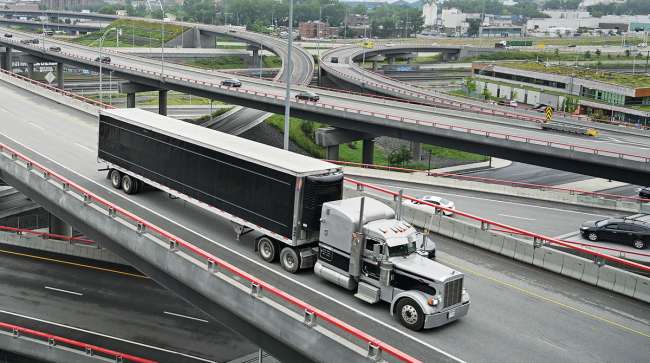Senior Reporter
ATA Celebrates Win as Trucker Tax Proposal Rejected

[Stay on top of transportation news: Get TTNews in your inbox.]
A quasi-government state taxing advisory authority has rejected a proposal by one of its special work study groups calling for a change in the method states use to tax motor carriers that American Trucking Associations said would have raised taxes significantly for most truckers.
A committee of the Multistate Tax Commission failed to muster a vote in support of the tax-basis change at its meeting late last month after ATA made it clear that its 50-state federation would strongly oppose the idea.
The proposal, which had been under discussion for about two years, called on replacing the mileage destination-based tax collection method with a “value of goods” method as the basis of state tax collection for motor carriers.
“It’s a win for the good guys,” said David Bauer, ATA’s vice president of state and tax policy. “It’s just not a good idea, and no one’s pining for it, except for states that are really looking at a backdoor tax increase.”

Bauer
The Multistate Tax Commission was drafted as a model law in 1966 by a widely representative group of state officials, including tax administrators, attorneys general, state legislators and a Special Committee of the Council of State Governments. The commission is an advisory group in that actions taken under its authority have only an advisory or recommendatory effect on its member states.
Bauer wrote two opposition letters to the commission on behalf of ATA, on June 22 and July 12. Indications are that the effort to change the tax method was being pushed by California and Massachusetts, two states among several coastal states and states with ports that likely would have benefited from the alternative tax collection method.
In his July letter, Bauer pointed out that trucking is an industry that has extensive tax, regulatory, safety and cost considerations to contend with on a daily basis and that many motor carriers are operating on small margins in a complex freight market subject to global and domestic economic headwinds.
The commission “seems to think that trucking is an easier industry to revisit the methodology,” Bauer said. “They kind of wanted to start with trucking. I don’t know why. It’s probably one of the worst industries in some ways to look at because it is complex, and there are a lot of tentacles around it.”
Jeff Loftus of FMCSA joins TT’s Seth Clevenger to discuss the current outlook on ADAS technology and how it will affect the industry at large. Tune in above or by going to RoadSigns.ttnews.com.
Bauer called the group “bureaucrats, who are not elected, not answerable to the public in the same way as a lawmaker or a governor is.”
The commission did not return a phone call requesting comment.
Some members of the study group had expressed the view that a value of the truckload rather than the mileage approach reflected the market and therefore was best aligned with the market-based approach to sourcing services, according to a Jan. 19 study group memo. However, others in the study group said the mileage approach has been adopted by most states and is working well.
“Therefore, there is no compelling reason to change to a pickup/delivery approach, and multiple reasons why the mileage approach should not be abandoned,” the memo said.
ATA has argued that “uniformity” has been a bedrock principle of taxing the trucking industry for well over half a century.
“The current mileage rule, by wide agreement, has served the industry and states well with very little disputes arising,” ATA said in a statement. “Using mileage, or proxies for mileage, has been a good and fair basis for taxing trucking, and we are pleased that the MTC has agreed and shelved this misguided plan.
“A proposal supported by the states of California and Massachusetts would have imposed taxes on trucking companies based on the value of goods being moved — a change that could have significantly impacted the industry’s tax burden and create the very division between sections of the country that the [MTC] Uniformity Committee is supposed to avoid.”
Want more news? Listen to today's daily briefing below or go here for more info:





